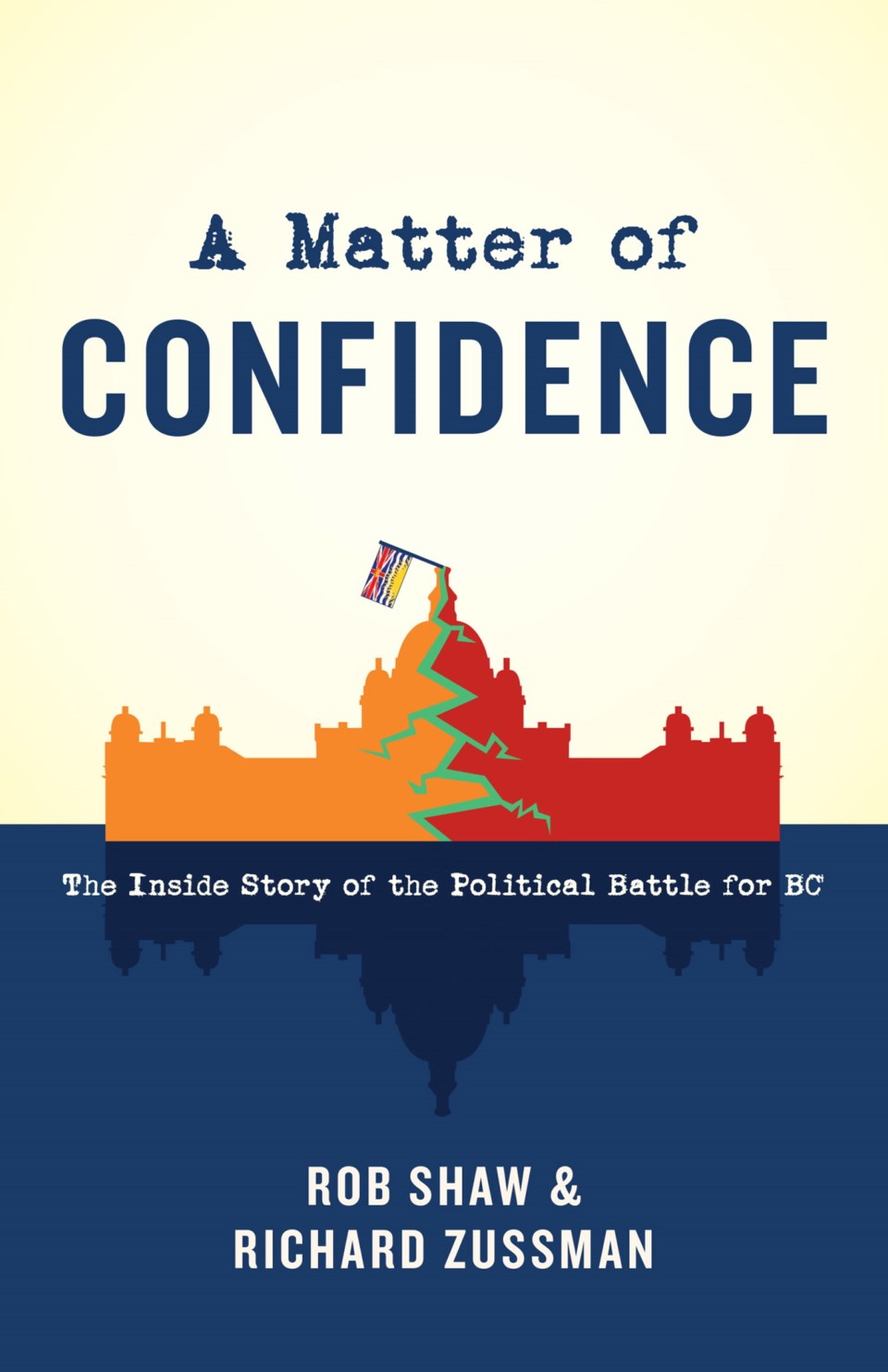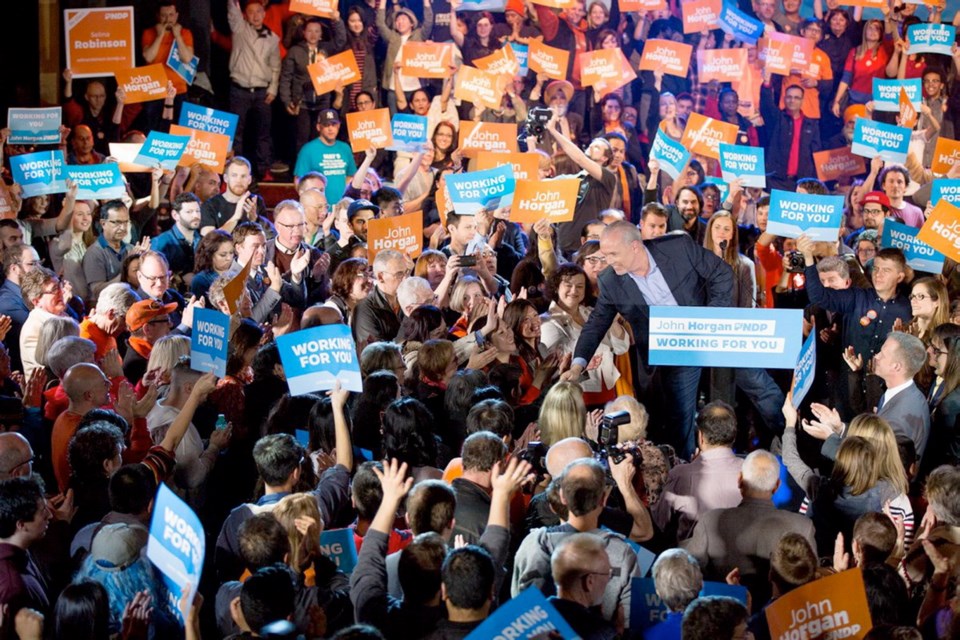When B.C. New Democrats went looking for a leader to replace Adrian Dix in 2013, there was one man who definitely didn’t want the job: John Horgan. In this excerpt from their new book A Matter of Confidence, Vancouver Sun columnist and former Times Colonist reporter Rob Shaw and Global News B.C. reporter Richard Zussman chronicle Horgan’s reluctant rise to party leader following the entry of his colleague Mike Farnworth’ into the race. The book also explores the rise and fall of Christy Clark and the historic confidence vote that made Horgan premier in 2017.
John Horgan was ready to officially enter the race as well, but he forgot one thing: to tell his wife. Ellie knew Horgan was strongly considering it, and it was something the family was ready for. But one morning, while all the pieces were still being put in place, Ellie heard on the radio that her husband was running for the NDP leadership. “She was a bit unhappy about that,” said Horgan in an interview for this book. “But I had committed that I was going to talk to her before anything happened and it came a little bit backwards, I think it was leaked. She is OK with it; she is still hanging out with me.”
 The Horgan campaign officially launched two weeks later, with Ellie’s blessing, on March 17, 2014. A crowd of almost two hundred people squeezed into the Isabelle Reader Theatre in his home riding. Horgan was joined onstage by Maurine Karagianis and Carole James. As a former leader, James had stayed out of endorsing candidates, but she broke her rule to support Horgan and said she was throwing her full weight behind his candidacy. The remaining dissidents who’d forced her out as leader in 2010 were largely lined up behind Farnworth, showing that the wounds from that rift had yet to fully heal within the party.
The Horgan campaign officially launched two weeks later, with Ellie’s blessing, on March 17, 2014. A crowd of almost two hundred people squeezed into the Isabelle Reader Theatre in his home riding. Horgan was joined onstage by Maurine Karagianis and Carole James. As a former leader, James had stayed out of endorsing candidates, but she broke her rule to support Horgan and said she was throwing her full weight behind his candidacy. The remaining dissidents who’d forced her out as leader in 2010 were largely lined up behind Farnworth, showing that the wounds from that rift had yet to fully heal within the party.
Horgan said he’d been surprised at all the younger candidates who’d come to him to ask him to step up, when he’d been waiting for them. He joked publicly, “I’m the younger generation I was looking for.”
But early on, things didn’t go as Farnworth had predicted. For the next month the supporters did not flock to him as he was hoping. Shortly after his announcement, he received a call from a longtime friend and former MLA. It was someone whose support he desperately needed, yet she told him, regrettably, she was going to back Horgan. Farnworth mulled over his best-case scenario among remaining supporters, did the math, and picked up the phone to call Horgan to tell him he was out.
The leadership race had now come down to one man — the guy who originally didn’t want the job. There was no one left in the NDP who wanted to challenge him. Horgan’s entire caucus stood behind him on April 8, 2014, and cheered at a press conference at the Hotel Grand Pacific in Victoria.
Horgan would quickly outline his positions as leader. “Where we have to go is out to the [Fraser] Valley, into the eastern suburbs and into the Interior,” he said of the future election strategy under his leadership. He altered Dix’s opposition to the Kinder Morgan pipeline, saying he’d take a “wait and see” position on the project. And he softened the rhetoric on the Site C dam, saying it had “always been a case of when” the project would be built, because the power would be needed eventually.
All three positions are worth noting, because Horgan would take the opposite approach on each by the time he got to his first election campaign in 2017. Despite his strong initial tone, he had great difficulty behind the scenes executing on that earliest vision in the face of the environmental wing within the party.
The new leader would spend much of his time trying to protect his left flank with a Green party threatening to siphon away supporters with its pro-environment agenda. Consequently, he would make major compromises on what had been long-held personal positions during his earliest days as leader.
Also, Horgan still wasn’t sure he could do the job. Partly it was an extension of his humble and modest personality, along with his tendency to self-deprecating humour, that would lead him to tell close advisers he was still worried the Liberals would savage him over the issue of his temper. “I can’t do this, I can’t win,” he said during meetings with Karagianis and James. “They are going to rip me into pieces because I’m the angry guy.”
As Horgan was struggling to establish name recognition, one of his colleagues was stealing the headlines. David Eby might not have run for leader, but he had become the NDP’s voice on many of the party’s key files and criticisms of the Liberal government. Time and time again the young MLA would dig up information on loopholes in Vancouver real estate, exposing questionable foreign investors or hammering away at Premier Clark about her $50,000-a-year stipend and cash-for-access political fundraisers.
On April 26, 2016, Vaughn Palmer published a column in the Vancouver Sun that said out loud what everyone was thinking. “No wonder that when speculation turns to who might be the next leader of the BC NDP, Eby tends to figure prominently in the list of possibilities,” read the last sentence of the column.
The issue wasn’t that Eby wouldn’t make a good leader — it was that the job wasn’t open. Eby didn’t solicit the story. He didn’t want the story. But there it was and it was awkward. Eby had already talked to Horgan about the substandard communications division within the NDP. The caucus was so careful not to say anything that might contradict the leader that its MLAs weren’t getting out to speak on issues in the media until it was too late and the headlines had passed.
He told Horgan the issues his office had him speaking about weren’t getting any news, and it was no wonder nobody knew who the leader was. Eby advocated for a much more aggressive communications strategy, and called on Horgan to join him on the front lines of the housing file, where Eby was scoring major points at the government’s expense.
Instead, Eby was later called into the leader’s office by a senior member of Horgan’s staff and told to back off on major files like housing affordability, the premier’s stipend and cash-for-access fundraisers, because they were crowding out Horgan’s press coverage. Eby disagreed completely, but toned it down. It meant he passed on crucial media coverage and in turn hurt the party’s chance to win the election.
By the fall of 2016, the tension between Horgan and Eby was real. In November, Vancouver Magazine published a list of the year’s most powerful people. Clark was No. 1, Eby No. 4 and Horgan No. 16. The magazine noted Horgan was “overshadowed by NDP front-bencher David Eby.” By this point, there were many voices in Eby’s ear telling him he should be leader — not in 2017, after Horgan lost, but now. “I have a two-year-old kid at home, I have a lot going on,” he would tell whoever would listen. “I would love to be a cabinet minister in a Horgan government. But I do not want to be touring the province right now, especially during a campaign.”
The rumblings about a possible takeover were getting back to the leader’s office. And once again Eby was booked in for a meeting. This time directly with Horgan. The tension was high. The rumours were swirling. Horgan had heard that not only did Eby want his job, but that he had put together a shadow leadership team. Both rumours disturbed him.
“It’s not true,” Eby said. “I want you to be premier. I want you to succeed.” Eby told the leader he didn’t think it was wise to tone down his attacks on housing and fraud in Metro Vancouver, and he again asked Horgan to be there alongside him, taking the lead on the file.
Their relationship had broken down from where it was just a few years earlier. But both recognized they needed each other for the NDP to win. Party morale was low, and the overwhelming sentiment in caucus was that they were all about to lose.
A year before the election, Horgan was openly talking about whether he should quit. Talk continued to persist that Horgan wasn’t the right guy to win the 2017 election. The leader still had lingering doubts about himself. He wasn’t there because of an undeniable craving to be premier; he was there to defeat what he saw as a bad government. Horgan made it clear to party president Craig Keating, executive director Raj Sihota and potential candidates outside the caucus that if they thought someone could do a better job than he could, he would step aside.
“I talked to them and said if you think you can do better, I am OK with that,” said Horgan in an interview for this book. “I canvassed widely. It’s not that I didn’t believe I was up for the job, but I didn’t want some excuses. I didn’t want anyone to have excuses.”
No one made the pitch they were better than Horgan. But it was clear the NDP needed some help from outside. It would soon arrive.
All are invited to attend the Victoria launch of A Matter of Confidence on Wednesday, March 28, 7 p.m., at Munro’s Books, 1108 Government St.
A Matter of Confidence: The Inside Story of the Political Battle for B.C., © Rob Shaw and Richard Zussman, Heritage House, 2018



